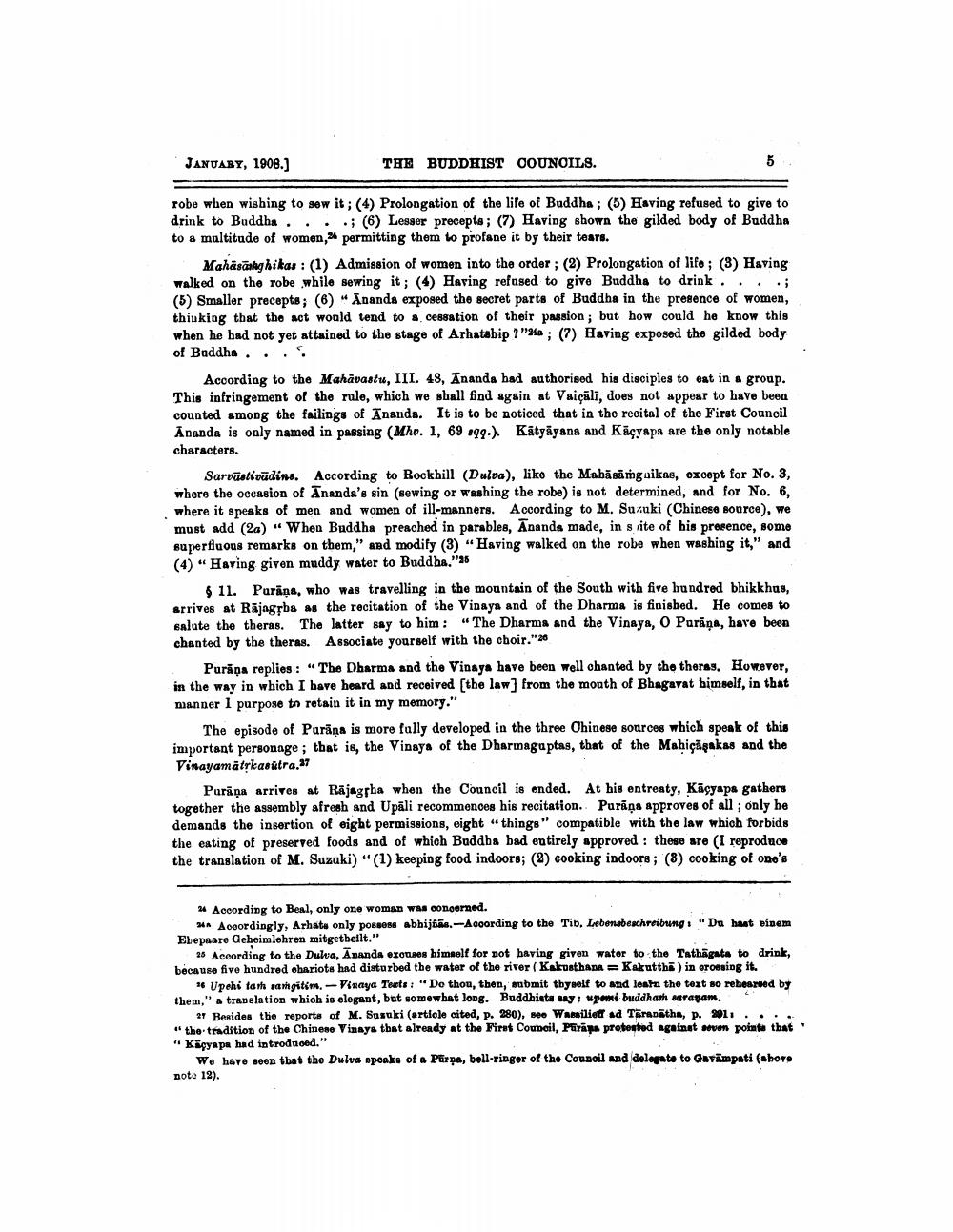________________
JANUARY, 1908.)
THE BUDDHIST COUNCILS.
robe when wishing to sew it; (4) Prolongation of the life of Buddha; (6) Having refused to give to drink to Buddha .... (6) Lesser precepts; (7) Having shown the gilded body of Buddha to a multitude of women, permitting them to profane it by their tears.
Mahäsānghikas: (1) Admission of women into the order ; (2) Prolongation of lifo ; (3) Having walked on the robe while sewing it; (4) Having refused to give Buddha to drink .... (5) Smaller precepts; (6) "Ananda exposed the secret parts of Buddha in the presence of women, thiuking that the act would tend to a cessation of their passion; but how could he know this when he had not yet attained to the stage of Arhatabip ? " ; (7) Having exposed the gilded body of Buddha ....
According to the Mahāvastu, III. 48, Ananda had authorised his disciples to eat in a group. This infringement of the rule, which we shall find again at Vaicāli, does not appear to have been counted among the failings of Ananda. It is to be noticed that in the recital of the First Council Ananda is only named in passing (Mho. 1, 69 299.) Katyāyana and Kaçyapa are the only notable characters.
Sarvāstivādins. According to Rockhill (Dulva), like the Mabāsāmgaikas, except for No. 3, where the occasion of Ananda's sin sewing or washing the robe) is not determined, and for No. 6, where it speaks of men and women of ill-manners. According to M. Suzuki (Chinese source), we must add (2a) "When Buddha preached in parables, Anands made, in s vite of his presence, some superfluous remarks on them," and modify (3) "Having walked on the robe when washing it," and (4) "Having given muddy water to Buddha."25
$11. Purina, who was travelling in the mountain of the South with five hundred bhikkhus, arrives at Rijngeba as the recitation of the Vinaya and of the Dharma is finished. He comes to Balute the theras. The latter say to him: "The Dharma and the Vinaya, O Puriņa, have been chanted by the theras. Associate yourself with the oboir."26
Purina replios: "The Dharma and the Vinaya have been well ohanted by the thoras. However, in the way in which I have heard and received (the law] from the mouth of Bhagavat himself, in that manner 1 purpose to retain it in my memory."
The episode of Parāņa is more fully developed in the three Chinese sources which speak of this important personage; that is, the Vinaya of the Dharmagaptas, that of the Mahicagakas and the Vinayamatykasutra.27
Parkņa arrives at Räjagpha when the Council is ended. At his entreaty, Kāçyaps gathers together the assembly afresh and Upāli recommences his recitation. Parāņa approves of all ; only he demands the insertion of eight permissions, eight things" compatible with the law which forbids the eating of preserved foods and of which Buddba bad entirely approved : these are (I reproduce the translation of M. Suzaki) "(1) keeping food indoors; (2) cooking indoors ; (8) cooking of one's
24 According to Beal, only one woman was concerned.
* Accordingly, Arbate only po nese abhijfãs. --According to the Tib. Lebensbeschreibung: "Du hast vinem Ehepaare Geheimlehren mitgeteilt."
25 According to the Duwa, Ananda exonses himself for not having given water to the Tathagata to drink, because five hundred ohariote had disturbed the water of the river (Kakusthana = Kakuttha) in orossing it.
* Upehi tarh sargitim.-Vinaya Texts: "Do thou, then, submit thyself to and learn the text so rehearsed by them," a travelation which is elegant, but somewhat long. Buddhista my wond buddhath sarapan.
21 Besides the reports of M. Susuki (article cited, p. 280), seo Wasilieff ad Taranatha, p. 4011.... " the tradition of the Chinese Vinays that already at the First Council, Parapa protested against seven point that "Küçyapa had introduced."
We have seen that the Dulva apoake of a Parns, bell-ringor of the Council and delegate to Gutampati (above note 12).




